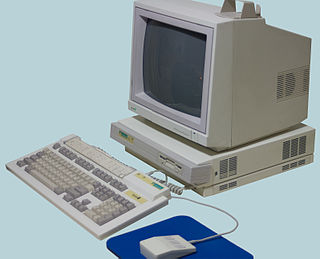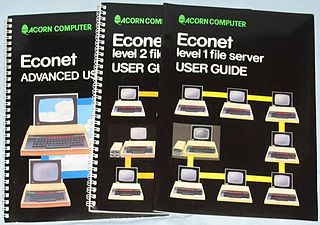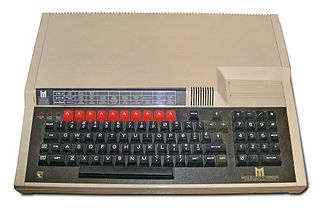Related Research Articles

The history of the graphical user interface, understood as the use of graphic icons and a pointing device to control a computer, covers a five-decade span of incremental refinements, built on some constant core principles. Several vendors have created their own windowing systems based on independent code, but with basic elements in common that define the WIMP "window, icon, menu and pointing device" paradigm.

BBC BASIC is a version of the BASIC programming language released in 1981 as the native programming language for the BBC Micro home/personal computer, providing a standardized language for a UK computer literacy project of the BBC. It was written mainly by Sophie Wilson.

Acorn Computers Ltd. was a British computer company established in Cambridge, England, in 1978. The company produced a number of computers which were especially popular in the UK, including the Acorn Electron and the Acorn Archimedes. Acorn's BBC Micro computer dominated the UK educational computer market during the 1980s.

Risc PC was a range of personal computers launched in 1994 by Acorn and replaced the preceding Archimedes series. The machines had a unique architecture unrelated to IBM PC clones and were notable for using the Acorn developed ARM CPU which is now widely used in mobile devices.

Acorn Archimedes is a family of personal computers designed by Acorn Computers of Cambridge, England. The systems are based on Acorn's own ARM architecture processors and the proprietary operating systems Arthur and RISC OS. The first models were introduced in 1987, and systems in the Archimedes family were sold until the mid-1990s.
RISC is an abbreviation for reduced instruction set computer.

RISC OS is a computer operating system originally designed by Acorn Computers Ltd in Cambridge, England. First released in 1987, it was designed to run on the ARM chipset, which Acorn had designed concurrently for use in its new line of Archimedes personal computers. RISC OS takes its name from the reduced instruction set computer (RISC) architecture it supports.
This article presents a timeline of events in the history of computer operating systems from 1951 to the current day. For a narrative explaining the overall developments, see the History of operating systems.

The Oberon System is a modular, single-user, single-process, multitasking operating system written in the programming language Oberon. It was originally developed in the late 1980s at ETH Zurich. The Oberon System has an unconventional visual text user interface (TUI) instead of a conventional command-line interface (CLI) or graphical user interface (GUI). This TUI was very innovative in its time and influenced the design of the Acme text editor for the Plan 9 from Bell Labs operating system.

RISC iX is a discontinued Unix operating system designed to run on a series of workstations based on the Acorn Archimedes microcomputer. Heavily based on 4.3BSD, it was initially completed in 1988, a year after Arthur but before RISC OS. It was introduced in the ARM2-based R140 workstation in 1989, followed up by the ARM3-based R200-series workstations in 1990.

Econet was Acorn Computers's low-cost local area network system, intended for use by schools and small businesses. It was widely used in those areas, and was supported by a large number of different computer and server systems produced both by Acorn and by other companies.
Xara is an international software company founded in 1981, with an HQ in Berlin and development office in Hemel Hempstead, UK. It has developed software for a variety of computer platforms, in chronological order: the Acorn Atom, BBC Micro, Z88, Atari ST, Acorn Archimedes, Microsoft Windows, Linux, and more recently web browser-based services.

The BBC Master is a home computer released by Acorn Computers in early 1986. It was designed and built for the British Broadcasting Corporation (BBC) and was the successor to the BBC Micro Model B. The Master 128 remained in production until 1993.
The Acorn Business Computer (ABC) was a series of microcomputers announced at the end of 1983 by the British company Acorn Computers. The series of eight computers was aimed at the business, research and further education markets. Demonstrated at the Personal Computer World Show in September 1984, having been under development for "about a year" and having been undergoing field trials from May 1984, the range "understandably attracted a great deal of attention" and was favourably received by some commentators. The official launch of the range was scheduled for January 1985.
Modula-2+ is a programming language descended from the Modula-2 language. It was developed at DEC Systems Research Center (SRC) and Acorn Computers Ltd Research Centre in Palo Alto, California. Modula-2+ is Modula-2 with exceptions and threads. The group which developed the language was led by P. Rovner in 1984.
Designer Castles was a software title for the BBC Micro and later Acorn Archimedes range of computers.
The Advanced Disc Filing System (ADFS) is a computing file system unique to the Acorn computer range and RISC OS-based successors. Initially based on the rare Acorn Winchester Filing System, it was renamed to the Advanced Disc Filing System when support for floppy discs was added and on later 32-bit systems a variant of a PC-style floppy controller.
RISCOS Ltd. was a limited company engaged in computer software and IT consulting. It licensed the rights to continue the development of RISC OS 4 and to distribute it for desktop machines from Element 14 and subsequently Pace Micro Technology. Company founders include developers who formerly worked within Acorn's dealership network. It was established as a nonprofit company. On or before 4 March 2013 3QD Developments acquired RISCOS Ltd's flavour of RISC OS. RISCOS Ltd was dissolved on 14 May 2013.
NCOS is the graphical user interface-based operating system developed for use in Oracle Corporation's Network Computers, which are discontinued. It was adapted by Acorn Computers from its own RISC OS, which was originally developed for their range of Archimedes desktop computers. It shares with RISC OS the same 4 MB ROM size and suitability for use with TV displays.
RISC OS, the computer operating system developed by Acorn Computers for their ARM-based Acorn Archimedes range, was originally released in 1987 as Arthur 0.20, and soon followed by Arthur 0.30, and Arthur 1.20. The next version, Arthur 2, became RISC OS 2 and was completed and made available in April 1989. RISC OS 3 was released with the very earliest version of the A5000 in 1991 and contained a series of new features. By 1996 RISC OS had been shipped on over 500,000 systems.
References
- ↑ "Acorn History (untitled)" . Retrieved 2010-12-26.
- ↑ "Chris's Acorns: Acorn A500 (prototype)" . Retrieved 2022-12-19.
- ↑ Rovner, Paul; Levin, Roy; Wick, John (11 January 1985). On Extending Modula-2 For Building Large, Integrated Systems (PDF) (Technical report). Digital Systems Research Center. Retrieved 14 February 2023.
- ↑ Bruce, Cockburn. "Aha – what about Modula-2?". Usenet post to comp.sys.acorn detailing the relationship between ARX and Modula-2
- 1 2 TOP3 smart moves Richard Cownie. Real World Technologies (September 2009)
- ↑ Chase, David. "David Chase (resume)" . Retrieved 2015-10-25.
- ↑ Jordan, Mick (1990). "An extensible programming environment for Modula-3" (PDF). SIGSOFT Software Engineering Notes. 15 (6): 66–76. doi:10.1145/99278.99285 . Retrieved 2009-09-08.
- ↑ "Brian T. Lewis - Resume". Archived from the original on 2004-05-01. Retrieved 2010-12-26.
- ↑ "Full Acorn Machine List" . Retrieved 2010-12-27.
- ↑ Holgate, Chris; Davison, Rob; Burke, Stephen; Given, David; Harris, Ben; Kendrick, Rob; Bracey, Kevin; Fenelon, Pete; Blunt, Terry; druck; Markettos, Theo; Kossow, Al; Zuschlag, Jesper; Barclay, Alan; Crocker, Stephen; Pampling, Steven; et al. "Not A RISC By Thursday". Neil Franklin's Usenet Archive. Retrieved 2020-02-07. A set of Usenet posts detailing why ARX was abandoned for RISC OS.
- ↑ "Fact or fantasy?". Archive. February 1988. p. 50. Retrieved 30 April 2021.
- ↑ "PC Emulator and Arthur". RISC User. September 1988. p. 44. Retrieved 30 April 2021.